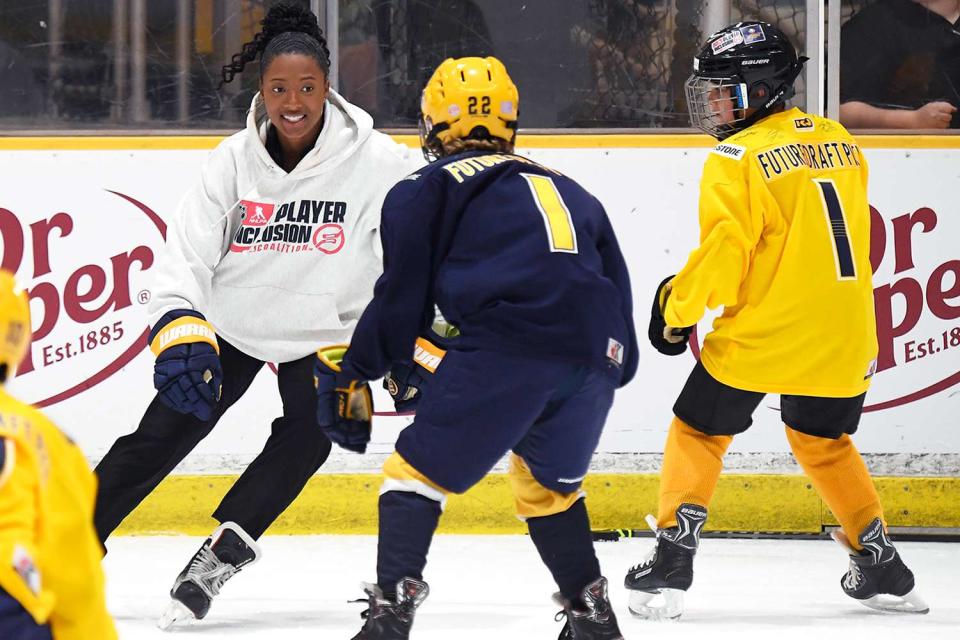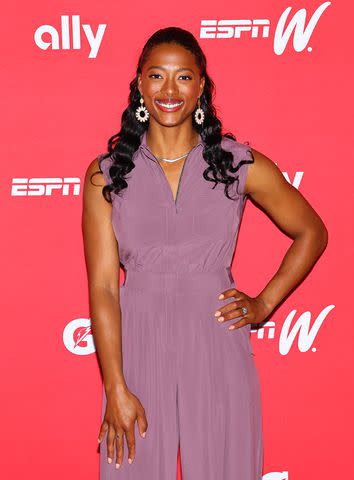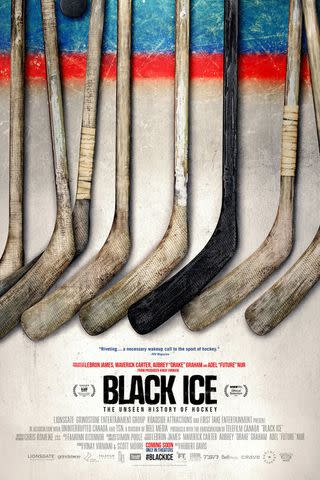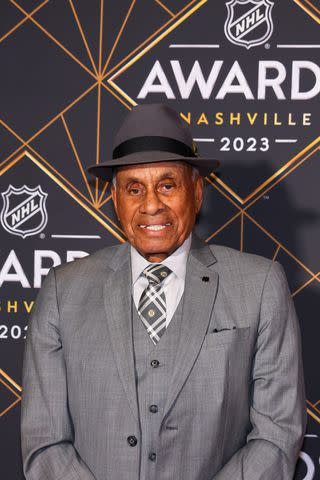Blake Bolden Wants the Hockey World to Know That 'Black People Have Always Been Playing Hockey' (Exclusive)
Bolden, a trailblazer in the sport as the first Black woman to play in a professional hockey league, appears in the upcoming documentary 'Black Ice'

Blake Bolden forged her own path to success in the world of hockey, and now she is paving the way for other Black players.
The Ohio native, 32, began playing hockey when she was 6 years old and went on to become the first Black woman to play in the Women's National Hockey League, as well as the first Black scout for the NHL. Bolden, who is featured in the upcoming documentary Black Ice — produced by big names like LeBron James, Drake and Maverick Carter — tells PEOPLE exclusively that although she always found it “challenging” to find her place in the sport while maintaining her identity as a woman of color, she knew it was where she was meant to be.
“I just knew that playing hockey was something that gave me so much purpose,” Bolden shares. “Whenever I would see a Black girl or a Black kid or someone of color coming up to me, and sometimes they would tell me I was the reason why they started playing hockey is because they didn't see anyone that looked like them — that is like the biggest sign of gratification, of purpose, that you could ever get.”
“It's almost bigger than just playing and putting your rubber puck in the net. So I felt like that was my reason for being on this planet.”

Arturo Holmes/Getty
Being seen as different has always been normal for Bolden, who says she was the only Black person at her high school all four years. Her mother, who worked three jobs as a single parent while Bolden was growing up, even warned her that the sport might be a lonely space.
“You're gonna be the only Black person on the team quite often. You might not see a lot of people that go that look like you,” Bolden says her mother told her.
Still, Bolden knew she had the skills to overcome any obstacles that got in her way — racial or not — and says she found peace on the ice despite often feeling like she had to put on “armor” out of the rink.
“When the game would start, all of that [struggle] dissipated, even if there was something negative that was said,” Bolden explains. “Fortunately for me, I was an incredible player and I would fight back with points that I would score or plays that I would make.”
Bolden adds that “you also have to thank the allies in the game that we have,” and says that she was lucky to be coached by people that supported her regardless of her skin color. One Olympic team coach, however, set a roadblock for Bolden — a topic she also touches on in Black Ice.
“The most challenging hockey experience in my life was when I was wrongly accused of being uncoachable, in my opinion,” she shares.
Recalling that moment, she explains: “In their deliberations and meetings, [she] put that slur on my name and my reputation. And I remember my college coach was a part of that meeting and she came and told me, ‘Hey, listen, this was said about you, and I think that is complete BS. I stood up for you. I don't think it's right, and I think that you should be on this Olympic team.’”

Lionsgate
Related: Seattle's New Hockey Team Hires the First Full-Time Black Play-By-Play Announcer in the NHL
As for her participation in Black Ice, Bolden says the film is offering insight into the world of hockey that has been somewhat hidden to others.
“Black people have always been playing hockey,” Bolden says. “And it's interesting that you're like, dang, there was a whole league.”
She adds: “I think a lot of people within hockey think that the sport is just for them. It's for everybody. It's for every background. It's for every socioeconomic status.”
Bolden says that the other athletes featured in the movie also motivated her to get involved: “To be able to be in that group, and especially alongside Willie O'Ree as one of the first people of color to play in the NHL, and me being the first woman of color to play professional women's ice hockey — I felt like I needed to be a part of it.”
“Even with all the crazy things that have happened to all of the people that have shared their stories in the documentary. It's like everybody's still trying to do the work to grow the game.”

Bruce Bennett/Getty
Never miss a story — sign up for PEOPLE's free daily newsletter to stay up-to-date on the best of what PEOPLE has to offer, from juicy celebrity news to compelling human interest stories.
Bolden says it has always been important to her to contribute to the expansion of Black members of the sport. After graduating high school, she attended Boston College, where she spent some of her proudest moments as a “high recruit” who “could have gone to any college” but chose that one.
“I wanted to help build their program,” she says. “I went there and we helped get that team to the final four, three years in a row, and then the program just exploded with success upon me graduating.”
Related: P.K. Subban Announces Retirement from NHL After 13 Seasons: 'This Chapter Is Closing'
The history-making hockey star went on to win the Isobel Cup, the championship for the WNHL, which she said is one of her greatest accomplishments, among others.
“I'm pretty proud of myself right now — just how far I've come, the history that I've been able to change,” she says.
Bolden, who has a mentorship program with the slogan, ‘Be True, Be You, Be Bold,’ says she may not have grown up with Black women hockey players to look up to, but now members in the sport have her — and other “role models” — to help them flourish.
Black Ice is in theaters on July 14.
For more People news, make sure to sign up for our newsletter!
Read the original article on People.

 Yahoo News
Yahoo News 
